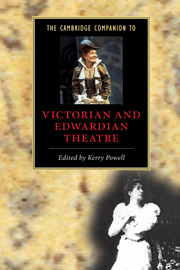Book contents
- Frontmatter
- Part 1 Introduction
- Part 2 Performance and context
- 1 Actors and acting
- 2 The show business economy, and its discontents
- 3 Victorian and Edwardian stagecraft
- 4 Music for the theatre
- 5 Victorian and Edwardian audiences
- 6 Performing identities
- Part 3 Text and context
- Select bibliography
- Index
- Series List
1 - Actors and acting
from Part 2 - Performance and context
Published online by Cambridge University Press: 28 May 2006
- Frontmatter
- Part 1 Introduction
- Part 2 Performance and context
- 1 Actors and acting
- 2 The show business economy, and its discontents
- 3 Victorian and Edwardian stagecraft
- 4 Music for the theatre
- 5 Victorian and Edwardian audiences
- 6 Performing identities
- Part 3 Text and context
- Select bibliography
- Index
- Series List
Summary
In the preface to the second volume of Plays Pleasant and Unpleasant (1898), George Bernard Shaw specifies the sort of actor he requires for the new kind of play represented by his first public success, Arms and the Man (Avenue Theatre, London, 1894). Actors in his plays, Shaw explains, had to become participants in transforming a society mired in pernicious romantic illusion into one grounded in a “genuinely scientific natural history.” The task was a demanding one. Actors in Shavian plays must comprehend mental states that “still seem cynically perverse to most people” and cultivate a goodhumored contempt for “ethical conventions” that had once seemed “validly heroic or venerable.” In his own sunny, arrogant way, Shaw is addressing actors who seldom if ever consider themselves the “abstract, and brief chronicles of the time,” as Hamlet had insisted they were, but who in Shaw's view amount nevertheless to epitomizing presences, reifying on stage the assumptions, attitudes, and prejudices of their age. Mere imitation of this kind, he insists, is no longer acceptable.
From our century-long perspective we can perceive Shaw to be aligning himself with the programmatic dramaturgy embraced by Continental practitioners of naturalism like Zola and Brieux, whose works reflected a “scientific” analysis of contemporary social conditions and their deleterious effects. Shaw’s champion exemplar of this radical strategy was, of course, Ibsen, whose “terrible art of sharpshooting” at an audience was intended, as Shaw would argue in his 1913 revision of The Quintessence of Ibsenism, to make them so uncomfortable that they would become “guilty creatures sitting at a play” (again, the idea is Hamlet’s) who might then rise up and reform society. Evidently, Shaw intends to draw actors away from unthinking service to a society against whose mores he is in revolt; for it is actors, he realizes, who are the ultimate means of enlisting audiences in that arduous enterprise.
- Type
- Chapter
- Information
- Publisher: Cambridge University PressPrint publication year: 2004
- 5
- Cited by

